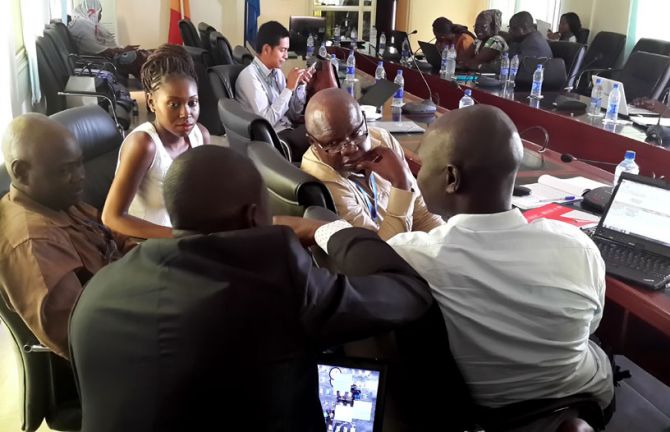


Debrief
New HIV advocacy plan to strengthen the AIDS response in Chad
08 October 2015
08 October 2015 08 October 2015Strategic partners in the response to AIDS came together from 28 to 30 September in N'Djamena, Chad to develop a common strategy and an HIV advocacy plan for the UN system.
Participants acknowledged that political leadership and commitment at the highest level, including from the Head of State and the First Lady, has played a critical role in the response to AIDS. The country provides free access to HIV treatment for people living with HIV and 46% of its health facilities offer HIV services to prevent mother-to-child transmission of HIV.
Despite progress made in the country—the HIV prevalence rate has declined from 3.3% in 2005 to 2.5% in 2014—challenges still remain. According to participants, the major obstacles to the national AIDS response are the lack of resources, coordination of health activities at community level, and the management of health supplies.
The workshop proceedings and the strategic document will be presented at the meeting of the UN Country Team for Heads of Agencies’ approval. This is a unique approach epitomizing the One UN approach.
Participants
Funded by UNFPA, participants included representatives from all UN agencies working in the country and the core of national stakeholders (CCM, NAC, PMTCT, RNTAP+, France Expertise, PSLS, Ministry of Women’s Affairs, FOSAP, AMASOT, TB, etc.).
Miss Chad 2015 took part in the workshop where she made a presentation on the forum she is organizing in November 2015 to address the issues of youth’s and young women’s education on HIV.
Key messages
Based on the situation analysis, participants identified the following main areas of advocacy where the UN system should focus its efforts:
- Contribute to the scale up of HIV services to prevent mother-to-child transmission.
- Contribute to the improvement of the data input management system
- Contribute to the extension of the delegation of tasks in all health facilities and official community structures.
- Support the implementation of AIDS programmes among youth and adolescents.
- Support the increased involvement of civil society in the national AIDS response.
- Help reduce stigma and discrimination among people living with HIV.
- Help mobilize financial resources to support the national AIDS response.
Quotes
"The key to accelerating the national response to HIV is appropriate and tireless advocacy vis-a-vis national authorities, all stakeholders, day in and day out."
"Today it is not only AIDS that kills but so does stigma. Not fighting discrimination leads to more infections and more deaths.”
“Young women are particularly vulnerable to HIV. I wish and pray that AIDS is defeated in the near future.”
“The detailed advocacy strategic document you have developed for the whole UN system in Chad will enable us to undertake joint advocacy activities, avoid duplications, determine priorities, harmonize efforts and maximize impact in accelerating the national response to HIV.”



